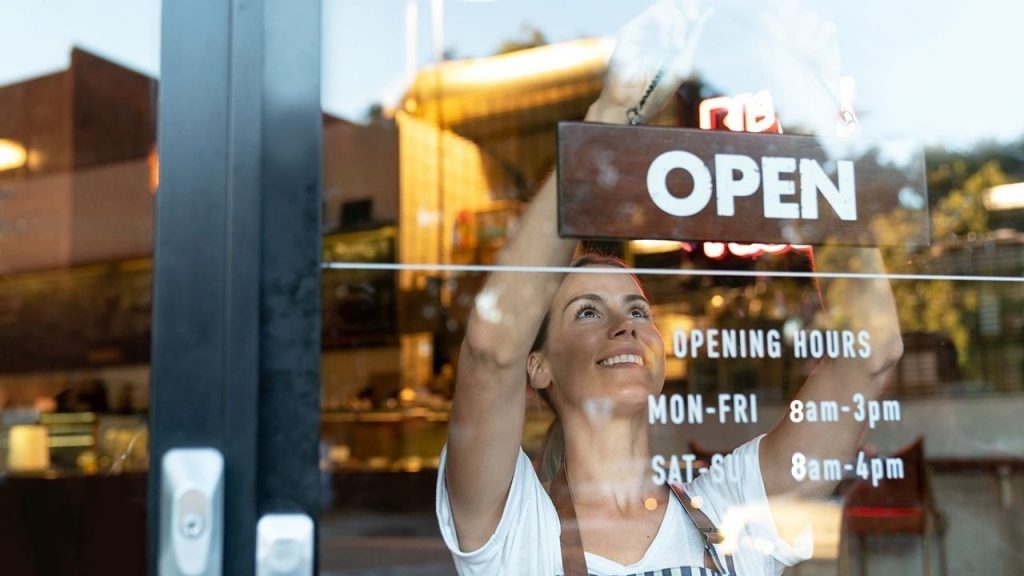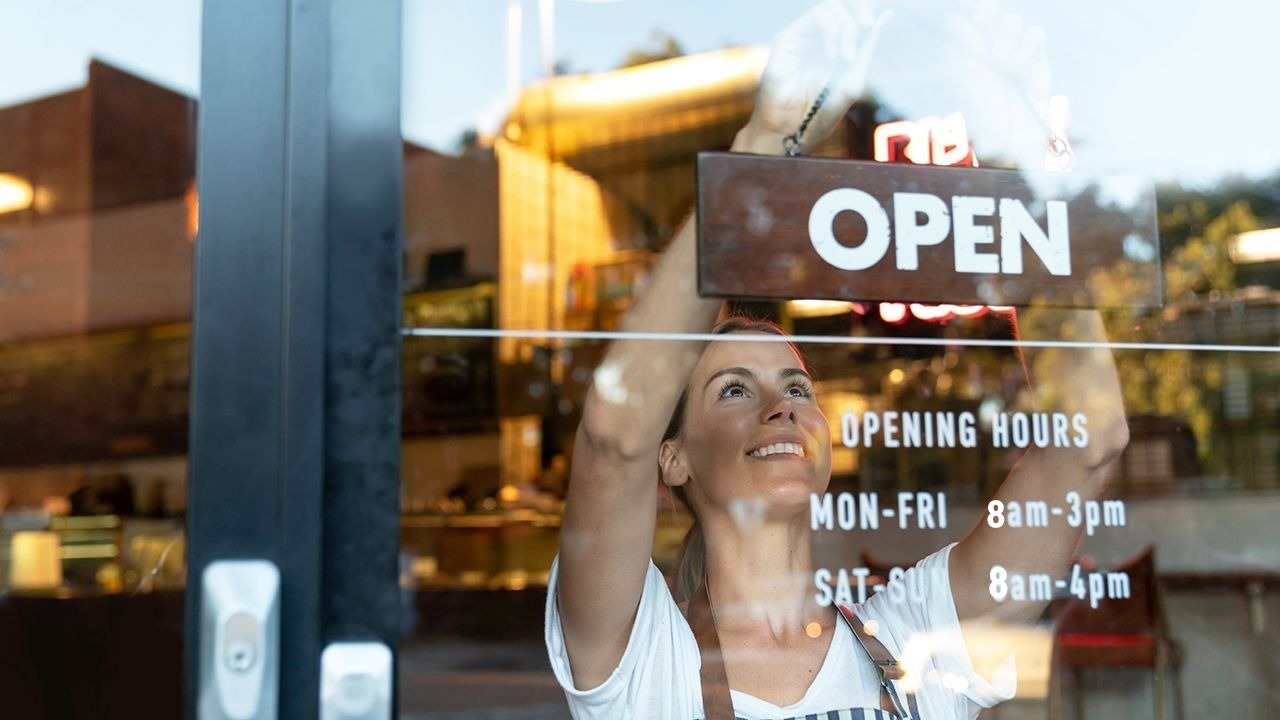SMBs Face Long Road to Recovery in 2021

Don’t let the positive vaccine news fool you. Small businesses are still feeling the impact of Covid-19 and the resulting shutdowns, even as we head into 2021. SMBs Face Long Road to Recovery in 2021.
According to a recent survey by Alignable, a small business networking site, 68% of SMBs say they are still experiencing a negative impact from the pandemic, and the percentage of business owners experiencing “significant” impact jumped 7% to 50% from June to November. Businesses that thought the crisis was heading in the right direction back in October are feeling differently today as they see holiday sales figures begin to roll out, and they’re scrambling to find tools, strategies, and other lifelines to help them get by.
“At the beginning of the pandemic, I would say that pivoting a physical store to online was one of the biggest transitions small business owners across the nation had to make in order to stay open. Now, as we are well into the pandemic and in the midst of the holiday season, small businesses are working hard to leverage their online presence to stay competitive and gain even more customers this season,” says Patrick Pulvermüller, president of the partners business at GoDaddy.
Pulvermüller and his team at GoDaddy have a front-row seat as they watch how SMBs are pivoting to keep their businesses afloat during this time of crisis. Pulvermüller says he’s seen many business owners investing more in e-commerce capabilities and finding creative ways to connect with customers on social media.
“Especially for businesses that are typically brick-and-mortar, finding new and creative ways to bring in new revenue streams online has been an uphill battle,” he says. “This year, we’ve seen many small businesses quickly pivot to offer e-commerce services for the first time.”
What kind of long-term impact this digital migration will have on the retail industry and economy at large is yet to be seen. In an SMB holiday forecast by Ecwid E-commerce, 73% and 70% of merchants said they will rely on email and organic social media, respectively, to advertise going forward. This marks a jump from pre-pandemic times.
Other surveys have found similar results, as more businesses jump on board the digital marketing train. A Moxtra study found that 92% of small businesses adopted new technologies during the pandemic, though those business owners didn’t all land on the right solution on the first try. Nearly two-thirds of those surveyed said the number of digital tools and technologies their companies use now makes some tasks more complex.
Social media marketing has become the obvious choice for SMBs, especially as the pandemic has worn on. A survey of business owners and consumers by Best SEO Companies found that seven in ten small businesses without a website are relying primarily on social media for web presence now. One in four small businesses owners without a website still believe they will “never need one.”
That approach is a big mistake in Pulvermüller’s eyes. The GoDaddy executive says e-commerce has gained significant traction in 2020, and he believes all-in-one systems that put website management, digital marketing, and online sales under one roof are a better approach for SMBs. GoDaddy’s recent acquisition of Poynt, a payment services technology tailored to small businesses, was based—at least in part—on an overarching belief that SMBs are better served by all-in-one, complete suites of commerce solutions.
Correcting Course
Businesses that were quick to pivot when the pandemic began may need to step back in 2021 and readjust their strategies, particularly if things begin to calm down in the first half of the year.
At Mobiquity, Senior Director of Customer Experience Britt Mills predicts that change management will be a top priority for businesses in 2021. Retailers that rushed to market with mobile experiences and strategies in response to Covid-19 could be looking at a course correction during the first half of the year, as they work on better ways to balance speed to market and operational readiness.
“Many brands went full speed ahead without taking operations and associate investments into consideration,” Mills says. “Through better employee training in 2021, brands can make sure their five-star app isn’t ruined by a disjointed in-person experience.”
Mills also predicts that 2021 could come with a dip in customer satisfaction for businesses, particularly those that rushed to market with new digital solutions in 2020. To avoid that dip, Mills suggests businesses survey their customers and continue to enhance their contactless experiences to accommodate the increasing preference for digital shopping.
The Smallest Struggle
Businesses with the smallest budgets have been among the hardest hit by the pandemic. While 55% of business owners say they feel “optimistic” in light of recent news about the delivery of a vaccine, 48% still don’t expect a recovery to occur until sometime after March 2021. Holding on until then could be tough, especially as Congress struggles to offer financial relief.
Adobe Spark is one of a number of martech platforms that has launched programs designed to help the SMB community take better advantage of digital marketing this year. Adobe’s project, put together with Square, was developed to help SMBs stand out online with professional marketing overhauls.
“While local shops aren’t going to be able to compete with big box retailers when it comes to deals and savings, small businesses can capture hearts with a community-driven approach,” said Amy Copperman, editorial and social media lead for Adobe Spark.
Professional initiatives usually come with a price tag that’s out of reach for businesses just trying to get by. More SMBs stepped into DIY website construction projects this year than previous years, and only two in five small business owners believe they have been investing a sufficient amount of money into their websites. But surveys show that business owners that have invested heavily on their websites are more likely to make a profit than those that have not.
Today, nearly half of SMBs (48%) say they are generating revenues below what they needed to stay in business. That’s a 6% increase since September, with travel, gyms, beauty salons, and restaurants being most at risk of permanent closure.
The lack of optimism among small business groups right now can feel grim, but Pulvermüller isn’t seeing that outlook among the businesses he’s in contact with personally. As he looks into 2021, Pulvermüller believes we’ll continue to see an uptick in SMBs not only creating new ventures, but also continuing to grow their new businesses online during the first quarter of the new year. He predicts that e-commerce will continue to dominate the retail industry and total e-commerce sales will reach record heights.
“The e-commerce space for small business owners will become increasingly competitive in the New Year, and it is imperative that entrepreneurs adopt tools and build a compelling online presence that breaks through the noise,” Pulvermüller says. “Additionally, we’ll also start to see technology such as AI transform the e-commerce experience and continue to personalize and improve how consumers shop online.”
According to a recent survey by Alignable, a small business networking site, 68% of SMBs say they are still experiencing a negative impact from the pandemic, and the percentage of business owners experiencing “significant” impact jumped 7% to 50% from June to November. Businesses that thought the crisis was heading in the right direction back in October are feeling differently today as they see holiday sales figures begin to roll out, and they’re scrambling to find tools, strategies, and other lifelines to help them get by.
“At the beginning of the pandemic, I would say that pivoting a physical store to online was one of the biggest transitions small business owners across the nation had to make in order to stay open. Now, as we are well into the pandemic and in the midst of the holiday season, small businesses are working hard to leverage their online presence to stay competitive and gain even more customers this season,” says Patrick Pulvermüller, president of the partners business at GoDaddy.
Pulvermüller and his team at GoDaddy have a front-row seat as they watch how SMBs are pivoting to keep their businesses afloat during this time of crisis. Pulvermüller says he’s seen many business owners investing more in e-commerce capabilities and finding creative ways to connect with customers on social media.
“Especially for businesses that are typically brick-and-mortar, finding new and creative ways to bring in new revenue streams online has been an uphill battle,” he says. “This year, we’ve seen many small businesses quickly pivot to offer e-commerce services for the first time.”
What kind of long-term impact this digital migration will have on the retail industry and economy at large is yet to be seen. In an SMB holiday forecast by Ecwid E-commerce, 73% and 70% of merchants said they will rely on email and organic social media, respectively, to advertise going forward. This marks a jump from pre-pandemic times.
Other surveys have found similar results, as more businesses jump on board the digital marketing train. A Moxtra study found that 92% of small businesses adopted new technologies during the pandemic, though those business owners didn’t all land on the right solution on the first try. Nearly two-thirds of those surveyed said the number of digital tools and technologies their companies use now makes some tasks more complex.
Social media marketing has become the obvious choice for SMBs, especially as the pandemic has worn on. A survey of business owners and consumers by Best SEO Companies found that seven in ten small businesses without a website are relying primarily on social media for web presence now. One in four small businesses owners without a website still believe they will “never need one.”
That approach is a big mistake in Pulvermüller’s eyes. The GoDaddy executive says e-commerce has gained significant traction in 2020, and he believes all-in-one systems that put website management, digital marketing, and online sales under one roof are a better approach for SMBs. GoDaddy’s recent acquisition of Poynt, a payment services technology tailored to small businesses, was based—at least in part—on an overarching belief that SMBs are better served by all-in-one, complete suites of commerce solutions.
Correcting Course
Businesses that were quick to pivot when the pandemic began may need to step back in 2021 and readjust their strategies, particularly if things begin to calm down in the first half of the year.
At Mobiquity, Senior Director of Customer Experience Britt Mills predicts that change management will be a top priority for businesses in 2021. Retailers that rushed to market with mobile experiences and strategies in response to Covid-19 could be looking at a course correction during the first half of the year, as they work on better ways to balance speed to market and operational readiness.
“Many brands went full speed ahead without taking operations and associate investments into consideration,” Mills says. “Through better employee training in 2021, brands can make sure their five-star app isn’t ruined by a disjointed in-person experience.”
Mills also predicts that 2021 could come with a dip in customer satisfaction for businesses, particularly those that rushed to market with new digital solutions in 2020. To avoid that dip, Mills suggests businesses survey their customers and continue to enhance their contactless experiences to accommodate the increasing preference for digital shopping.
The Smallest Struggle
Businesses with the smallest budgets have been among the hardest hit by the pandemic. While 55% of business owners say they feel “optimistic” in light of recent news about the delivery of a vaccine, 48% still don’t expect a recovery to occur until sometime after March 2021. Holding on until then could be tough, especially as Congress struggles to offer financial relief.
Adobe Spark is one of a number of martech platforms that has launched programs designed to help the SMB community take better advantage of digital marketing this year. Adobe’s project, put together with Square, was developed to help SMBs stand out online with professional marketing overhauls.
“While local shops aren’t going to be able to compete with big box retailers when it comes to deals and savings, small businesses can capture hearts with a community-driven approach,” said Amy Copperman, editorial and social media lead for Adobe Spark.
Professional initiatives usually come with a price tag that’s out of reach for businesses just trying to get by. More SMBs stepped into DIY website construction projects this year than previous years, and only two in five small business owners believe they have been investing a sufficient amount of money into their websites. But surveys show that business owners that have invested heavily on their websites are more likely to make a profit than those that have not.
Today, nearly half of SMBs (48%) say they are generating revenues below what they needed to stay in business. That’s a 6% increase since September, with travel, gyms, beauty salons, and restaurants being most at risk of permanent closure.
The lack of optimism among small business groups right now can feel grim, but Pulvermüller isn’t seeing that outlook among the businesses he’s in contact with personally. As he looks into 2021, Pulvermüller believes we’ll continue to see an uptick in SMBs not only creating new ventures, but also continuing to grow their new businesses online during the first quarter of the new year. He predicts that e-commerce will continue to dominate the retail industry and total e-commerce sales will reach record heights.
“The e-commerce space for small business owners will become increasingly competitive in the New Year, and it is imperative that entrepreneurs adopt tools and build a compelling online presence that breaks through the noise,” Pulvermüller says. “Additionally, we’ll also start to see technology such as AI transform the e-commerce experience and continue to personalize and improve how consumers shop online.”





